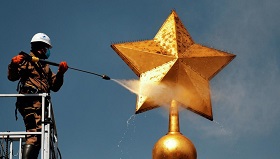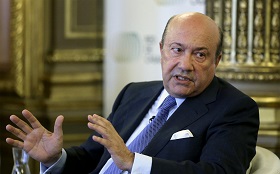Six months ago, when COVID-19 had just moved beyond the borders of China and embarked upon its triumphant march across Europe and North America, politicians and foreign affairs experts started discussing what will happen after the virus is vanquished. The debate that ensued balanced the fears and concerns of pessimists with the hopes and expectations of optimists, with the latter believing that the pandemic and the global recession that followed would inevitably force humankind to put its differences aside and finally unite in the face of common challenges.
Six months later, we can say without any doubt that, unfortunately, the optimists were wrong. The pandemic did not bring about the changes in world politics they had been hoping for, even with the ensuing recession making things worse. And we are unlikely to see any such changes in the near future. Sadly, COVID-19 did not turn out to be a cure-all for regional conflicts, arms races, the geopolitical competition and the countless ailments of humankind today.
These persisting ailments are more than evident in relations between Russia and the West. No positive steps have been made in the past six months in any of the areas where the positions of the two sides differ significantly, be it the conflict in Eastern Ukraine, the unrest in Syria, the political instability in Venezuela or the war in Libya. The fate of the New START and the nuclear nonproliferation regime remains unclear. Moscow continues to be the target of new economic and political sanctions. Russia and the West are locked in an intense information war. There are no signs of a “coronavirus ceasefire,” let alone a full-fledged peace agreement, on the horizon.
The balance of power between the agencies involved in the development and practical implementation of Russia’s foreign policy has changed significantly in recent years. The role of the security forces has been growing in all its aspects since at least the beginning of 2014. Conversely, the role of diplomats, as well as that of the technocrats in the economic structures of the Russian government, has been dwindling with each passing year. It is the security forces that are the main “stakeholders” in Donbass, Syria, Libya and even Belarus today. It would be fair to say that they have had a controlling interest in Russia’s foreign policy. The oft-quoted words of Emperor Alexander III that Russia has only two allies, its army and its navy, perfectly reflect the shift that has taken place in the balance of powers between these agencies. We should add that this shift was largely welcomed and even supported by a significant part of Russian society (see the third point). Of course, the siloviki are, due to the specifics of their work, less inclined to compromise, concessions and basic human empathy than diplomats, economists and technocrats.
All these factors preventing the conceptual renewal of Russia’s foreign policy can equally be applied to its geopolitical opponents. Politicians in the West are also hoping that time is on their side, that Moscow will emerge from the crisis weaker and more vulnerable, and thus more malleable than it was before. They also believe that any unilateral steps, any demonstration of flexibility in relations with the Kremlin, will be met with an even tougher and more aggressive policy. Negative ideas about Russia have also taken root in the minds of people in the West, and foreign policy is being "militarized" there just as much as it is in Russia.
Thus, neither the coronavirus nor the economic recession will automatically lead to a détente, let alone a reset in relations between Russia and the West. We are, in fact, moving in the opposite direction, once again running the risk of an uncontrolled confrontation. However, this unfortunate situation is no reason to give up on the possibility of signing new agreements, even if COVID-19 will no longer be in our corner moving forward.
Six months ago, when COVID-19 had just moved beyond the borders of China and embarked upon its triumphant march across Europe and North America, politicians and foreign affairs experts started discussing what will happen after the virus is vanquished. The debate that ensued balanced the fears and concerns of pessimists with the hopes and expectations of optimists, with the latter believing that the pandemic and the global recession that followed would inevitably force humankind to put its differences aside and finally unite in the face of common challenges.
Six months later, we can say without any doubt that, unfortunately, the optimists were wrong. The pandemic did not bring about the changes in world politics they had been hoping for, even with the ensuing recession making things worse. And we are unlikely to see any such changes in the near future. Sadly, COVID-19 did not turn out to be a cure-all for regional conflicts, arms races, the geopolitical competition and the countless ailments of humankind today.
These persisting ailments are more than evident in relations between Russia and the West. No positive steps have been made in the past six months in any of the areas where the positions of the two sides differ significantly, be it the conflict in Eastern Ukraine, the unrest in Syria, the political instability in Venezuela or the war in Libya. The fate of the New START and the nuclear nonproliferation regime remains unclear. Moscow continues to be the target of new economic and political sanctions. Russia and the West are locked in an intense information war. There are no signs of a “coronavirus ceasefire,” let alone a full-fledged peace agreement, on the horizon.
Of course, Moscow has placed the blame for the lack of progress squarely on the shoulders of its western partners. While this may indeed be true in many respects, we must admit that the Kremlin has hardly been overflowing with ideas and proposals over the past six months. Even if Moscow did want to reverse the current negative trends in global politics, it has not taken any steps on its own to do so. Nor has it proposed any large-scale international projects, or even tried to temper its usual foreign policy rhetoric and propaganda.
On the contrary, the various troubles that have befallen Russia in the “coronavirus era” – from the public unrest in Belarus to the unfortunate poisoning of Alexei Navalny – are explained away as the malicious intrigues of Russia’s geopolitical opponents. For all intents and purposes, the Kremlin is in the same position now, in September 2020, that it was in back in March. The chances of another “reset” or at least a “timeout” in relations have disappeared completely, if they ever existed in the first place.
So, why did the “coronavirus ceasefire” never happen? Without absolving the West of its share of responsibility, let us try to outline the obstacles that Russia has put in the way of progress.
First, in an environment of unprecedented shocks and cataclysms, there is always the hope that your opponent will eventually suffer more as a result than you will. Many in Russia see the 2020 crisis as the final damning indictment of the West and even an inglorious end to the market economy and political liberalism in general.
The recent statement by Aide to the President of the Russian Federation Maxim Oreshkin that Russia is poised to become one of the top five economies in the world this year is particularly noteworthy. Not because the country is experiencing rapid economic growth, but because the German economy is set to fall further than the Russian economy. If you are certain that time is on your side and that you will emerge from the crisis in better shape than your opponents, then the incentives to work towards some kind of agreement hic et nunc are, of course, reduced.
Second, the current Russian leadership is convinced that any unilateral steps on its part, any shifts in Moscow’s foreign policy, will be perceived in the West as a sign of weakness. And this will open the door for increased pressure on Moscow. Not that this logic is entirely unfounded, as history has shown. But it is precisely this logic that prevents Russian leaders from admitting their past foreign policy mistakes and miscalculations, no matter how obvious they may have been. This, in turn, makes it extremely difficult to change the current foreign policy and develop alternative routes for the future. In fact, what we are seeing is a game to preserve the status quo, in the hope that history will ultimately be on Moscow’s side, rather than that of its opponents (see the first point).
Third, six and a half years after the crisis in Ukraine broke out, we are essentially left with a frozen conflict. Turning the large and unwieldy state machine around, rewiring the somewhat heavy-handed state propaganda machine, and changing the policies that determine the everyday actions of the army of “deep state” officials is tantamount to changing the trajectory of a supertanker carrying a load of hundreds of thousands of tonnes. It is perhaps even more difficult, however, to change the opinion that has taken shape in Russian society in recent years about the modern world and Russia’s place in it. Just because the Russian people are tired of foreign politics, this does not mean that they will enthusiastically support an updated version of Mikhail Gorbachev’s “new thinking” of the second half of the 1980s or the ideological principles of Boris Yeltsin and Andrei Kozyrev’s foreign policy of the early 1990s.
Fourth, the balance of power between the agencies involved in the development and practical implementation of Russia’s foreign policy has changed significantly in recent years. The role of the security forces has been growing in all its aspects since at least the beginning of 2014. Conversely, the role of diplomats, as well as that of the technocrats in the economic structures of the Russian government, has been dwindling with each passing year. It is the security forces that are the main “stakeholders” in Donbass, Syria, Libya and even Belarus today. It would be fair to say that they have had a controlling interest in Russia’s foreign policy. The oft-quoted words of Emperor Alexander III that Russia has only two allies, its army and its navy, perfectly reflect the shift that has taken place in the balance of powers between these agencies. We should add that this shift was largely welcomed and even supported by a significant part of Russian society (see the third point). Of course, the siloviki are, due to the specifics of their work, less inclined to compromise, concessions and basic human empathy than diplomats, economists and technocrats.
All these factors preventing the conceptual renewal of Russia’s foreign policy can equally be applied to its geopolitical opponents. Politicians in the West are also hoping that time is on their side, that Moscow will emerge from the crisis weaker and more vulnerable, and thus more malleable than it was before. They also believe that any unilateral steps, any demonstration of flexibility in relations with the Kremlin, will be met with an even tougher and more aggressive policy. Negative ideas about Russia have also taken root in the minds of people in the West, and foreign policy is being "militarized" there just as much as it is in Russia.
Thus, neither the coronavirus nor the economic recession will automatically lead to a détente, let alone a reset in relations between Russia and the West. We are, in fact, moving in the opposite direction, once again running the risk of an uncontrolled confrontation. However, this unfortunate situation is no reason to give up on the possibility of signing new agreements, even if COVID-19 will no longer be in our corner moving forward.






